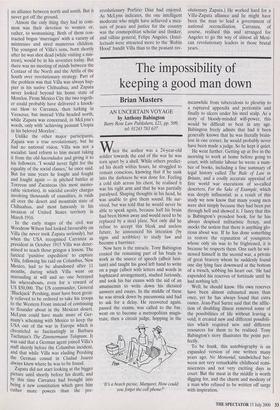The impossibility of keeping a good man down
Brian Masters
AN UNCERTAIN VOYAGE by Anthony Babington Barry Rose Law Publishers, £21, pp. 509, tel: 01243 783 637
hen the author was a 24-year-old soldier 'towards the end of the war he was torn apart by a shell. While others predict- ed his death within hours, he struggled to remain conscious, knowing that if he sank into the darkness he was done for. Feeling a cold slab across his chest, he realised it was his right arm and that he was partially paralysed. Shaping thoughts in his head, he was unable to give them sound. He sur- vived, but was told that he would never be able to speak again, because half his brain had been blown away and would need to be replaced by a steel plate. Not only did he refuse to accept this bleak and useless future, he announced his intention (by signs and scribbles) to study law and become a barrister.
Now here is the miracle. Tony Babington coaxed the remaining part of his brain to work as the source of speech (albeit hesi- tant) and taught his good left hand to write on a page (albeit with letters and words in haphazard arrangement), studied furiously, and took his bar exams with the aid of an amanuensis to write down his dictated answers and essays. In the middle of these he was struck down by pneumonia and had to ask for a delay. He recovered again, passed the exams, was called to the bar, went on to become a metropolitan magis- trate, then a circuit judge, hopping in the 'It's a beach picnic, Margaret. How could you forget the cell phone?' meanwhile from tuberculosis to pleurisy to a ruptured appendix and peritonitis and finally to ulcers under his steel scalp. As a story of bloody-minded will-power, this would be difficult to beat in any age. Babington freely admits that had it been generally known that he was literally brain- less in one corner, he would probably never have been made a judge. So he kept it quiet.
He went further. Getting up at five in the morning to work at home before going to court, with infinite labour he wrote a num- ber of books, including a fine summary of legal history called The Rule of Law in Britain, and a coolly accurate appraisal of first world war executions of so-called deserters, For the Sake of Example, which was deeply influential; as a result of this study we now know that many young men were shot simply because they had been put through hell and showed it. I fancy that this is Babington's proudest book, for he has always despised militaristic frenzy, and mocks the notion that there is anything glo- rious about war. If he has done something to restore the reputation of youngsters whose only sin was to be frightened, it is because he respects them. One such he wit- nessed himself in the second war, a private of great bravery whom he suddenly found one day lying face downward at the bottom of a trench, sobbing his heart out. 'He had expended his reserves of fortitude until he had nothing left.'
Well, he should know. His own reserves have been almost exhausted more than once, yet he has always found that extra ounce. Jean-Paul Sartre said that the afflic- tion of disabling illness removed some of the possibilities of life without leaving a void; it created new and different possibili- ties which required new and different resources for them to be realised. Tony Babington's story illustrates the point per- fectly.
To be frank, this autobiography is an expanded version of one written many years ago, No Memorial, sandwiched bet- ween not very remarkable childhood remi- niscences and not very exciting days in court. But the meat in the middle is worth digging for, and the charm and modesty of a man who refused to be written off surge with inspiration.


























































 Previous page
Previous page